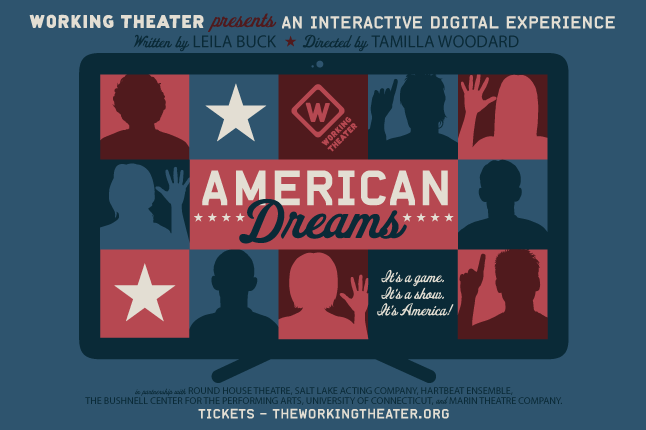‘American Dreams’ Uses Reality TV Tropes to Discuss Political Identity
Having participants vote puts the audience in the spotlight and makes them part of the game
COURTESY OF WORKING THEATER
A promotional poster for the play. The digital performance takes advantage of the medium by including audience participation.
October 21, 2020
“American Dreams” is an off-Broadway digital play produced by Working Theatre in collaboration with a number of smaller companies. Co-creators Leila Buck and Tamilla Woodard use the format of a competition show to examine the intricacies of American identity. The highly parodic play depicts a world in which the only way to gain U.S. citizenship is by competing in a live online game show run by the government.
In the play, three contestants go through challenges that combine apparently incongruous subject matter, ranging from a trivia game titled “How America Works” to multiple guessing games to a final segment where contestants are interrogated on current political topics.
The contestants compete for the final prize: U.S. citizenship and the opportunity to become the “newest neighbor” of audience members.
In the same way that our current political system functions, the dynamics of the play divide the participants into two groups: the TV contestants and the audience. The two groups escape normal theatrical distinctions between actors and the audience, action and contemplation, and fiction and reality.
“American Dreams” generates and constantly reaffirms ideas of oppositions, the genuinely American and the decidedly other, only to fervently and systematically call such an arrangement into question.
The audience is invited to participate in the action, breaking the passive relationship between audience and actors. Indeed, the audience is intimately involved in the outcome of the play by deciding which contestant is ultimately going to win.
The liminal figures of the hosts introduce each segment of the show and are a part of the fictional aspect of the play, as they are not contestants. Rather than facilitating connections between the contestants and the audience, the two hosts are purportedly part of the larger audience of American citizens; however, they are clearly still actors.
In this sense, the hosts serve as a playful example of how social roles are performative rather than genuine.
“American Dreams” generates and constantly reaffirms ideas of oppositions, the genuinely American and the decidedly other, only to fervently and systematically call such an arrangement into question.
The formula of the play parodies several aspects of Americanness, in particular at moments where the audience faces the arbitrariness of some of the categories that are used to illustrate the concept of American identity.
At one point, when one of the contestants is asked to name “America’s favorite book,” it appears that the audience is as much at a loss as the contestant. In another example, the various polls that the audience is asked to complete prove how consensus is difficult to achieve even when the question being asked is trivial.
The play also takes advantage of the nature of the digital space.
In one challenge, “The Hot Seat,” each contestant answers questions while members of the audience vote by putting thumbs up or thumbs down emojis on their screens. Such a polarizing, visually striking arrangement would hardly have been possible anywhere outside of the digital realm.
By highlighting the contradictory aspects of a fixed notion of identity, the play is able to advocate for inclusion, both politically and aesthetically. “American Dreams” places the audience as well as the participants in an active role in order to examine what it means to be an American. The answer, of course, remains inconclusive; the exercise of asking the audience to examine this question is the true value of this show.
Performances are running now until November 15, and you can reserve tickets on Working Theatre’s website.














